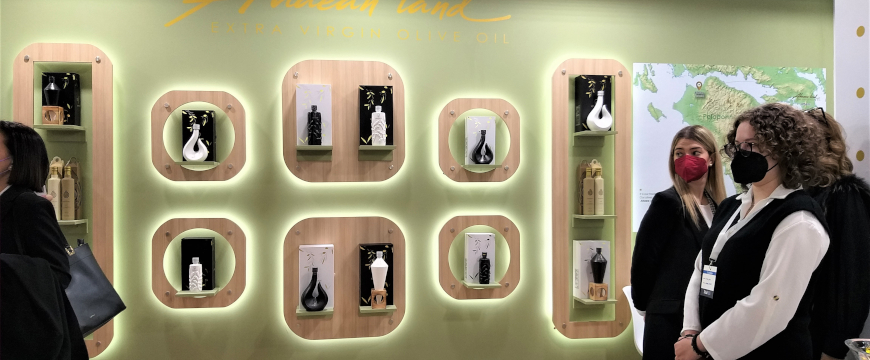At the first face-to-face Food Expo in Athens since 2019, company representatives confronted an unusual situation. Mingling in crowds larger than many had seen in the two years of the COVID-19 pandemic, food industry professionals were glad to present new products, initiatives, and innovations, but concerned about the effects of new and ongoing challenges.
After passing through vaccine certificate and ID checks at the Metropolitan Expo Center near the Athens airport on March 12-14, 1200 exhibitors met with 28,600 professionals from 80 countries. Even as snow fell on the Expo’s first day, the Greek olive oil sector was well represented, with a large number of relatively new companies appearing at their first Food Expo.
Greek olive oil company representatives’ attitudes ranged from appreciation for the strong interest in their nutritious products to concern about the unpredictable state of affairs worldwide in the face of COVID, climate change, inflation, and war. Several discussed recent problems related to the supply chain (especially bottle shortages), high costs (particularly for energy, packaging, and transport), and the war in Ukraine (which increased uncertainty about already unpredictable circumstances).
For example, while Dimitris Tsarpalis of Sparta Groves commented that weekend crowds at the Expo showed that “people are hungry for trade shows,” he also discussed rising prices for packaging and raw materials, as well as the general disruption created by the war. Tsarpalis had business inquiries from new contacts in Mexico, Brazil, and the Maldives. These buyers were trying to purchase olive oil because they couldn’t find sunflower oil, about 80% of which comes from Ukraine and Russia.
In the middle of March, Tsarpalis was under the impression that a growing demand for olive oil as a substitute for sunflower oil was leading to increasing olive oil prices. Some Greek olive oil producers also had the same idea. For the first time, one of Tsarpalis’s sellers cancelled a transaction after agreeing on a price, because the seller wanted to wait for higher prices.
(However, according to the Association of Cretan Olive Municipalities, SEDIK, olive oil prices in the main producing countries ended up remaining fairly stable throughout the last month. To the extent that they did fluctuate, Vassilis Zampounis reported in Olivenews.gr on April 8 that “upward price volatility” in olive markets has passed and been replaced by a “stabilization / slight decline.”)
With a Bulgarian bottle supplier also refusing to sell in the middle of March because higher prices were expected, buyers saying they couldn’t accept price increases, and inflation seeming to guarantee those increases, according to Tsarpalis, the Food Expo took place at a chaotic moment. So Tsarpalis took the extraordinary step of quoting a price that would be valid only for the same day, not for the month he used to allow.
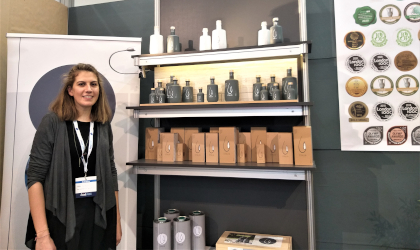
In addition to facing increasing costs for bottles and transportation, Katerina Bougatsou of Stalia olive oil company was unable to get the bottles designed by her sister from the company that makes them in Italy. Because of this, she would not have gone to the Food Expo this year if she had not already paid for participation in the Expo two years ago, when it was cancelled due to COVID.
On the other hand, Bougatsou said, “the good thing is people want olive oil. We have orders.” Fortunately, her bottles are expected by August, when many of the orders will be due. With a new, more economical 1.5 liter tin this year in addition to their half liter bottles and new 250 ml bottles of organic EVOO, Bougatsou reported that they had “many ideas, but we need to have products” available in bottles.
In the stand next door to Stalia’s, Marianna Devetzoglou of Oleosophia olive oil company was delighted to participate in her first exposition. “It is good to connect with so many people,” she commented; “in two years I haven’t seen so many at one time.” Devetzoglou believes the numerous new olive oil companies at this year’s Expo increase competition in the sector “in a good way. Greek olive oil as a whole is moving forward. If this happens, people learn about the quality of Greek olive oil and learn about Greek varieties. This helps the sector as a whole. The first success is to have someone buy Greek olive oil.”
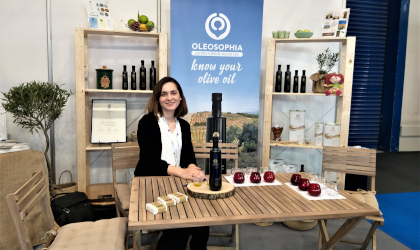
Devetzoglou was also hopeful since she feels that the pandemic has inspired many consumers to seek out more nutritious products, “because it was the first time everyone, no matter your age, started thinking ‘I’m not invulnerable.’ A lot of people started turning toward a more nutritious diet: ‘let’s build up our immune system.’” That led to an increased demand for healthier foods, and “olive oil is one of the most nutritious foods.”
Devetzoglou was introducing a new product at the Expo: Oleosophia’s November Harvest EVOO, “a natural blend” of Manaki (80%) and Megaritiki (20%) olives that grow together in the olive grove. This is no mere gimmick; Devetzoglou explained that Megaritiki trees help Manaki trees with pollination. Interested in helping the planet, the Oleosophia team is also working on minimizing plastic in their packaging.
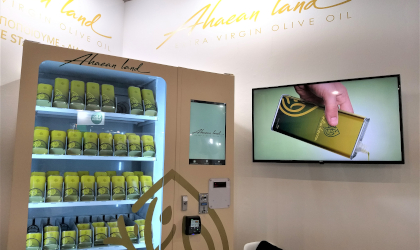
At the stand for Ahaean Land olive oil, two innovations stood out. One was the company’s striking bottle designs (pictured, top of page). Inspired by ancient Greek ceramics from Achaia (Ahaea) and Arcadia, these high-end luxury products are meant to appeal to tourists. The second innovation was a surprising new invention: a vending machine for olive oil. Kostas Kaberos explained that the vending machine is currently in the experimental stage. With pilot projects now underway in northern, western, and southern Greece, the company is considering the best combination of location, store type, and consumer profile for its use.
Why put olive oil in a vending machine? Kaberos suggested that this might make sense for last-minute purchases just before tourists leave the site of the best memories on their vacation, such as their hotel. The machine could provide easy access to sturdy tins in large hotels’ mini markets, for example.
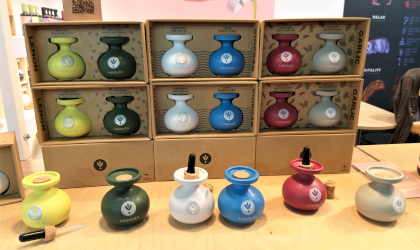
In an unpredictable time worldwide, it was encouraging to discover new products and innovations, to admire olive oil in uniquely designed bottles, and to talk with people who were actually in front of us. Expo participants could feel the crowds’ energy, make and renew connections, and enjoy a sense of hope and activity in spite of the novel and ongoing challenges businesses and consumers now face.
All businesses, organizations, and competitions involved with Greek olive oil, the Mediterranean diet, and/or agrotourism or food tourism in Greece, as well as others interested in supporting Greeks working in these sectors, are invited to consider the advertising and sponsorship opportunities on the Greek Liquid Gold: Authentic Extra Virgin Olive Oil website. The only wide-ranging English-language site focused on news and information from the Greek olive oil world, it has helped companies reach consumers in more than 215 countries around the globe.


